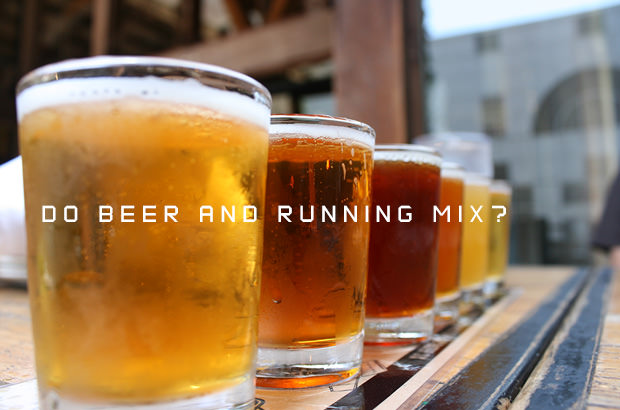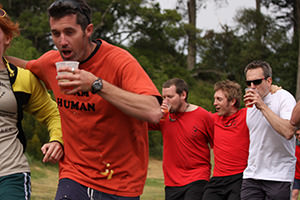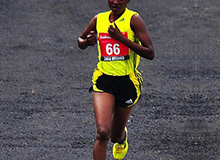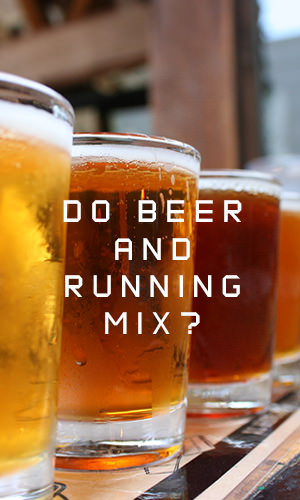
Do Beer And Running Mix?
Posted on 03 Jun, 2019

Some runners like to have a beer the night before a run to calm the nerves. And many others like to have one after, to celebrate a job well done. There are two camps on this; the one that says alcohol is bad for your running, and the other that says one or two are fine. To put this argument to bed once and for all, we’ve made an exploration into alcohol's effects on running performance and recovery.
Beer Benefits
 Beer carries multiple B vitamins, such as folate, niacin, riboflavin, vitamins B6 and B12 and pantothenic acid. And the malt and hops used to make dark beers contain flavonoids which can help heart function and reduce the risk of cancer.
Beer carries multiple B vitamins, such as folate, niacin, riboflavin, vitamins B6 and B12 and pantothenic acid. And the malt and hops used to make dark beers contain flavonoids which can help heart function and reduce the risk of cancer.
Beer also contains chromium, which aids in converting carbohydrates to energy. It’s even been linked to an increase in bone density by depositing calcium and minerals to bone.
Beer can reduce stress, calm the nerves and boost spirits.
Beer Before A Run
 There are many runners who joke that beer before a run counts as carbo loading. Unfortunately, it’s weak in terms of nutrient density compared to healthy foods and other beverages.
There are many runners who joke that beer before a run counts as carbo loading. Unfortunately, it’s weak in terms of nutrient density compared to healthy foods and other beverages.
The idea that beer provides a significant amount of carbs is a misconception. A 12-ounce bottle contains 12 grams of carbohydrates, which is equivalent to about half a slice of bread. What's more, because of the way alcohol is metabolized, most of these excess carbs are stored as fat. So you're actually fat-loading.
There is, however, a psychological component to alcohol consumption that has some merit; to boost spirits and reduce stress. But while beer may calm the nerves as you are drinking it, what would probably ensue is a night of low quality sleep. Some studies suggest that as little as 12 ounces can disrupt the most beneficial kind of sleep, causing you to feel groggy when you wake.
Beer During A Run
 It’s funny, but groups like the Hash House Harriers map their runs around local bars, using them as aid stations. It’s no wonder that some have labelled them as the drinking club with a running problem.
It’s funny, but groups like the Hash House Harriers map their runs around local bars, using them as aid stations. It’s no wonder that some have labelled them as the drinking club with a running problem.
Alcohol functions as a diuretic, and there’s no question that poor hydration can be a detriment to performance. A few sips on a short fun run like the Beer Belly two-miler may not be such a big deal, but one should still be cautious. Alcohol causes lack of coordination and impairs judgment, and this can cause you to trip or not be as alert to hazards along your route.
The carbonation in beer also empties slowly from the stomach, increasing the risk of bloating and cramping.
Beer After A Run
 You’ve completed a long, hard run. You’ve earned those beers. Right?
You’ve completed a long, hard run. You’ve earned those beers. Right?
Most of us are so eager to have a tall cold beer that we will embrace any health claim made about it. But let’s be honest with ourselves. There are much better ways to get vital nutrients, like by drinking milk for example.
Runners experience an inflammatory response after running a race. This is due to the increased stress placed on the body when competing in such a strenuous event. But alcohol delays the body's ability to heal by limiting the production of natural anti-inflammatories.
Beer’s diuretic properties can also hamper your hydration, which is vital for recovery. Beer is also processed through the liver, an organ that is vital for muscle recovery. With the liver already overworked from the alcohol, your body’s ability to properly recover is reduced.
Good nutrition should never be sacrificed for empty alcohol calories. Beer displaces carbohydrates from your diet, impairing muscle glycogen storage at a time when restoration of glycogen should be a priority. If you choose to have a beer after a race, drink something else first since alcohol can interfere with refuelling. Replenish with some water and carb or protein snacks before you start clanging glasses.
The Compromise
 There's no reason for runners to feel like beer can never cross their lips. The key, as with any indulgence, is moderation. Be in tune with how your body responds to alcohol. Know your limits.
There's no reason for runners to feel like beer can never cross their lips. The key, as with any indulgence, is moderation. Be in tune with how your body responds to alcohol. Know your limits.
Pay particular attention to your state of hydration. Ensure you’re properly hydrated with non-alcoholic fluids before drinking alcohol. Try to match alcohol intake with non-alcoholic fluid sources.
Just because it is ok to drink does not mean it’s a reason to drink. For those who are running for pleasure, the mild negative effects are probably not a big deal. But if you’re a competitive runner, you may want to err on the side of caution.
Photo Credits
Helpful Books For Hangovers



by Dan Vaux-Nobes


 Inspirational Running Quotes For When Your Tank Is Empty
Inspirational Running Quotes For When Your Tank Is Empty Most Surprising Unhealthy Foods
Most Surprising Unhealthy Foods Best Running Signs Pertaining To Booze
Best Running Signs Pertaining To Booze Do You Really Need to Stop Drinking While Training for a Race?
Do You Really Need to Stop Drinking While Training for a Race?










